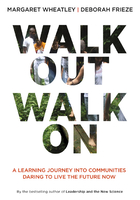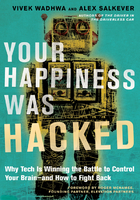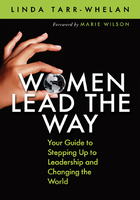CRACKS IN THE REGIME
I have conversations with my students that run something like this:
ME: Is our current corporate regime going to crack up?
STUDENT A: No. Americans are just too comfortable right now.
STUDENT B: And they voted to re-elect George W. Bush, the ultimate corporate president.
ME: Do you see any cracks or crises that might eventually lead to regime change?
STUDENT C: Ibet that economic and social problems—like jobs and health care—could eventually cause real problems.
STUDENT D: And the war in Iraq or other wars could help bankrupt the country.
ME: How bad do you think things will have to get before we see regime change?
STUDENT E: I think it will take another Great Depression.
MANY STUDENTS AT ONCE: She's right!
All U.S. regimes before the current one have eventually cracked up. Almost from the beginning, small cracks opened up in each regime and widened over time. Eventually, certain cracks became big chasms that created large-scale popular discontent and major social movements seeking to create regime change. This could happen again.
My students are no dummies. They know it took a Depression to crack open the last corporate regime in the 1920s. They are also right that most Americans are not mobilizing to topple the current corporate regime. Some are too comfortable; others are too propagandized; others want change but feel helpless. And while polls tell us that most Americans worry about the huge influence of corporations and big money in politics, they do not want to kill the corporate golden goose and they see no alternative to the corporate regime.
But despite what my students think, it does not take a Depression to topple a regime. The first corporate regime of the robber barons succumbed in 1900 to the Progressive regime without the help of a depression. And Ronald Reagan put an end to the New Deal regime also without any depression, although in both 1900 and 1980 economic cracks—in the form of recessions and stagflation that played havoc with workers' lives—played a major role.
My students may also be wrong about the implications of Bush's 2004 reelection. The Election Trap leads Americans to read the results of elections as indicators of the stability of the existing order. This is another illusion. Elections like Bush's 2004 victory can mask serious regime cracks. Herbert Hoover cruised to victory in 1928, an apparent resounding triumph for the corporate regime of his day. A year later, the markets crashed, and three years later the second corporate regime was history.
You are becoming a victim of the Election Trap if you believe that Bush's two wins show that the regime is in good shape. Do not view the results of elections as reliable signs of how stable the regime is. When presidents lose, as Bush Sr. did in 1992, it does not mean the regime is cracking. And when presidents are reelected, as his son was, the regime cracks might be growing bigger.
In this chapter, I will show that significant cracks have opened up in the third corporate regime. But they will have to get worse before we see regime change and nobody can predict how long the process will take or whether these cracks will bring the regime down. The cracks will lead to regime change only if they become so severe that the elites cannot fix them and if social movements arise out of the suffering and dislocations and successfully organize to change the regime.
Nor can we be sure that any future regime change will be progressive rather than reactionary. If the current corporate regime cracks up, the country could lurch dramatically to the right rather than to the left—toward an Or-wellian regime that I call "Fascism Lite." But while the outcome is in doubt, the cracks are already visible and they spell trouble for the regime.
WHY REGIMES CRACK UP
Karl Marx predicted internal contradictions that would destroy capitalism, but he was only half-right. Contradictions emerge in U.S. regimes but they typically create different versions of capitalism itself—sometimes more humane, sometimes more ruthless. While multiple U.S. regime crack-ups have not ended capitalism, they have delivered big changes in the direction of the country. When a regime cracks up, watch out: it will change your life dramatically.[1]
In fact, regime cracks are a principal basis for system change in America. They provide the opening that social movements need to bring down a regime and create one they prefer. Regime-busting cracks include:
Economic cracks (the 1890s recessions or the 1970s stagflation)
Political cracks (the 1920s huge Teapot Dome corruption scandal)
Social cracks (the 1890s huge gap between the rich and poor)
Military cracks (unwinnable wars like Vietnam)
Cracks in the elite (the 1901 GOP schism between Theodore Roosevelt progressives and Taft conservatives)
There is no historical formula about how quickly the cracks open up and blow the regime apart. It can happen precipitously, as in 1929 with the market crash, or over several decades, as in the case of the economic, political, cultural, and military crises that brought down the New Deal. But no American regime thus far has survived more than four or five decades.
At the core of every regime change is what I call the central contradiction of the regime, a deep source of the cracks that can lead to regime change. It cannot be resolved within the framework of the regime itself and becomes more transparent and lethal as new historical conditions make the regime increasingly obsolete. While each corporate regime has its own unique contradictions, they all are related to the pursuit of profit and power at the cost of the well-being of ordinary workers and democracy itself. Corpocracy and democracy are incompatible. Corporate regimes crack up when the harm to citizens becomes so great that they become "mad as hell and won't take it anymore."[2]
But why have all corporate regimes failed in this way? After all, if productivity grows, it can produce major improvements in workers' standard of living, as happened even in the ruthless corporate regime of the nineteenth-century robber barons. The problem has been that all corporate regimes eventually lose their capacity to create growth and productivity at a level that sustains both the regime and ordinary workers. This often arises partly because of the excessive power and greed of the elites, who take more than their fair share and torpedo their own systems, an obvious problem displayed nakedly by the Enrons and WorldComs of today.
All corporate regimes, though, have failed to meet the needs of both their workers and elites because they have not been able to adapt to changing conditions. History suggests that regimes ultimately fall on their own swords, unable to manage the changing and contradictory conditions of the very systems they create. Again, this creates quite different but closely related central contradictions in different corporate regimes. The robber barons of the first corporate regime knit together a national market, but could not create—indeed often opposed—the complex national government apparatus necessary to manage competition, create uniform national standards, and stabilize severe national business cycles. Similarly, the huge global corporations of today toppled the New Deal by creating globalization, but have failed to produce the global governing structures to manage a profoundly unstable global economy. This has put unsustainable burdens on the U.S. government, the American military, and American workers.[3]
As cracks widen, the regime ultimately reaches a tipping point. The regime contradictions reach a level of intensity that makes the regime lurch toward the precipice. Before the tipping point, regime elites are typically capable of patching up the cracks. The population falls into the Election Trap, focused on near-term elections rather than the long-term crises of the regime. But at the tipping point, the patchwork fails and the regime politics boil over into a struggle for regime change.
HISTORY OF A CRACK UP
Before looking at the deepening cracks in the current regime, consider how an earlier regime—the first corporate regime in the age of the robber barons—cracked up. It is a useful introduction to the cracks arising in the current regime—and how they might bring it down and transform America.
HOW REGIMES CRACK UP
Central Contradiction
image
Economic Cracks Political Cracks
Military Cracks Cultural Cracks
image
Tipping Point
image
Regime Death and Regime Change
The central contradiction of the first corporate regime involved the mismatch between the new national corporation and the national government. That mismatch allowed the corporation to run roughshod over the country. There was no regulatory system that could restrain the robber barons' greed for profit and power. This weakened democracy and harmed millions of poor and immigrant workers. Ninety percent of working Americans lived in poverty, turning them against the regime. The regime's legitimacy and credibility—its hegemony among the population—eroded.
While this is well understood, there is a second, equally important side of this contradiction. The absence of a regulatory state system—or what I call the regulatory vacuum—also hurt the corporations themselves, even as it allowed them to plunder the country. Despite their antigovernment rhetoric, corporations have always needed a large national government to help them weed out or regulate low-cost competitors at home and abroad, to subsidize the training of workers and the building of roads and communications systems, and to manage the business cycles and keep the economy from tanking into recessions or a depression.[4]
THE FIRST CORPORATE REGIME
Central Contradiction: Regulatory vacuum
Economic Cracks: Multiple recessions; Deepening business cycles
Political Cracks: Massive corruption; Clamor for antitrust and corporate regulation
Social Cracks: Mass poverty; Huge gap between rich and poor
Splits in the Elite: Schism in Republican Party between progressives and conservatives
Tipping Point: Assassination of President William McKinley leading to presidency of Vice President and Progressive leader Teddy Roosevelt
The absence of a regulatory state was thus a crisis not only for the workers but for the corporate system itself. The robber barons who ran the first corporate regime were caught in a central contradiction of their own making. On the one hand, they promoted laissez-faire rhetoric and opposed the growth of government so that they could create monopolies and gouge as much profit from workers as possible without fear of regulation. But on the other hand, they needed a highly developed government for the purposes just mentioned. It would take a regime change to create a government that would simultaneously protect both the workers and the larger corporate order.[5]
Because the robber barons prevented the regulatory state that their system required, a whole set of cracks began to emerge early in the first corporate regime, becoming very pronounced just before Teddy Roosevelt became president. The economic cracks led to severe recessions in the 1870s, 1880s, and especially the 1890s, with 1893 bringing the worst financial crisis the country had seen. These business cycles took a severe toll on millions of workers, who suffered mass layoffs and became the nation's first "disposable" workforce. But they also cast a deepening economic shadow on the whole corporate regime, as investors began to question the stability of the system.
The absence of a developed regulatory apparatus meant that the robber barons had no political recourse but massive corruption—from the beginning of the regime—to try to save their skins. Rampant bribery became the order of the day and leading tycoons such as John D. Rockefeller openly bought the votes of senators to prevent antitrust laws. They also spent millions to elect corporate presidents who sent in troops when necessary to put down strikes. These puppet presidents also appointed blatantly pro-corporate Supreme Court justices who interpreted the Constitution to give corporations legal personhood and constitutional protection of "equal protection" under the Fourteenth Amendment, a measure presumably passed to protect freed slaves, not corporations. All this created growing radical political dissent.
The social crises of the regime grew very serious in the 1880s and 1890s. In this period, Rockefeller, Morgan, and Carnegie became the country's first billionaires, while 90 percent of the workers lived in poverty. The gap between rich and poor made Gilded Age America seem a parody of the old European aristocratic order. The robber barons' estates were replicas of palaces like Versailles; at their parties one might see "monkeys seated between the guests, human gold fish swimming about in pools, or chorus girls hopping out of pies."[6] But as historian Richard Hofstadter writes, this wealth was achieved at "a terrible cost of values.… The land and the people had both been plundered."[7] A new class warfare bubbled up, led by rural populists and urban immigrant workers.
All these conditions set the stage for an unanticipated tipping point: the killing of President McKinley right after his reelection in 1900. Teddy Roosevelt, his vice president, was neither populist nor socialist, but he could not ignore the now nakedly exposed cracks in the corporate regime. Calling himself a progressive and a trust-buster, Roosevelt sided with the growing public sentiment against the naked power of the corporate robber barons.
This reflected a split among the elites, a very significant regime crack that often signals a coming regime change. The dominant Republican Party fractured into an old guard led by President Taft and the progressive wing represented by Roosevelt. Roosevelt recognized that the Gilded Age regime of the old Republican guard was doomed, and he set out to create regime change.[8]
CRACKS IN THE THIRD CORPORATE REGIME
Cracks in today's regime are widening rapidly, much like those of the robber baron regime in the 1880s and 1890s. Regime elites, now as then, are ensnared in contradictions of their own making that are leading them to grab what they can before the whole system comes apart. We have not yet reached a tipping point, but consider the current realities that could eventually create regime change.[9]
Today's cracks—involving unprecedented American debt, global economic crises, a new class of "anxious workers," and unwinnable wars—are more explosive than those that blew apart the robber-baron corporate regime a century ago. While we have not yet reached a tipping point, the cracks will get worse, because they are expressions of an underlying central contradiction that even the most brilliant corporate thinkers and their allies in Washington will never be able to untangle. The new contradiction is the mismatch between the new global economy and the old system of national sovereignty. Like the robber barons who opposed a stronger federal government, today's regime elites do not want a global government that can restrain their greed or regulate their global factories. They thus espouse the same religion of free markets and global laissez-faire that the robber barons enshrined in the United States. Yet they need a global government to manage global competition, harmonize conditions across countries, help stimulate global demand, and stabilize the new global markets they have created. Without such global governance, the entire global economy becomes increasingly vulnerable to financial crises, uncontrollable recessions, and deepening global poverty.[10]
THE THIRD CORPORATE REGIME
Central Contradiction: American Overstretch
Economic Cracks: Debt; Recessions; Job security; Enron-type scandals
Political Cracks: Crises of credibility and legitimacy at home and abroad
Social Cracks: Growing poverty and inequality; Environmental crises
Military Cracks: Quagmire in Iraq; Endless war on terrorism
Splits in the Elite: Schisms in the Republican Party between moderates and radicals, and between religious and corporate conservatives
Tipping Point: Unknown
True, regime elites have created global institutions like the World Trade Organization (WTO), the International Monetary Fund (IMF), and the World Bank. They are in a position to control these embryonic world governments, and thus have allowed them to grow. Yet they have kept them largely subordinate to U.S. dominance, precisely because they fear that they could lose control and face a global governing system that would limit their profits. Meanwhile, these organizations are losing global legitimacy, precisely because they are viewed by poor nations and the world's workers as corporate handmaidens.[11]
Corporate elites have looked to the U.S. government to step in and perform the regulatory functions of world government. American political leaders have been happy to oblige, eager to take on the role of "leader of the free world" or global hegemon. Since global corporations provide the money to get them elected, American political leaders of both parties have willingly embraced the need to support a global corporate regime. This not only buys greater funds for the next election, but offers the rationale for Empire.
American Empire may appear a happy solution for both corporate elites and Washington's political classes. But it is the flip side of the regime's global regulatory crisis: American overstretch. American overstretch is an inevitable consequence of asking a single natio n—even one as powerful as the United State s—to assume the role of global government. While the United States was capable of assuming such functions immediately after World War II, when Europe and Japan had been destroyed and the U.S. economy was an unchallenged powerhouse, things have changed. As Europe and Asia rebuilt after the war, the United States lost the economic dominance that would allow it to finance and manage the global order.
Acting as a global government is an extremely costly proposition. Uncle Sam has to:
Sustain the dollar as the world's reserve currency
Maintain global demand to ward off global recession
Bail out countries whose financial collapse might threaten the world's economy
Create a trade system assuring the global protection of corporate profits
Proffer a veneer of social regulation to gain legitimacy among the world's workers
Use military force to prevent serious disruptions of the corporate regime's global markets—from the Middle East to Latin America to Asia
All of this means spending a lot of money and, increasingly, a lot of blood. American overstretch is not identical to the classical imperial overstretch described by historian Paul Kennedy, in which the financial burdens of empire eventually sink it.[12] But the current American overstretch and the classical imperial forms are converging. American empire is creating heated anti-Americanism around the world, particularly since the unilateralism of the war in Iraq. The costs of maintaining U.S. hegemony after 9/11 are mounting in a period when U.S. deficits are spiraling and neoconservative ideology is promoting global U.S. overextension.
American overstretch is unsustainable for economic, political, military, and social reasons. But as long as there is no global government, America must do the job or the third corporate regime will unravel. Like their robber baron ancestors, the corporate leaders of the regime are impaling themselves on the horns of this dilemma. If they accept genuine global government, the third corporate regime will succumb to the will of the global majority and be replaced by a new order no longer based on national sovereignty and American hegemony. But if the regime's elites continue to rely on America as a surrogate for world government, American overstretch will eventually bankrupt the U.S. government and crack open the regime in a host of other ways. Either way, the regime faces extinction.[13]
We already see today glaring regime cracks that reflect American overstretch. Let's take a look.
ECONOMIC CRACKS
The regime is running up the largest national debt in U.S. history. Right after the 2004 election, in its first act on November 3, 2004, Congress had to raise the national debt ceiling to $8.18 trillion, the highest ever and destined to rise dramatically when the costs of the Iraqi war and the president's tax cuts were fully factored in. The president's proposed changes in Social Security, his highest domestic priority, would add another almost $2 trillion to the current debt. The nation's unfunded liabilities are projected in one of President Bush's own Treasury Department reports to run as high as $44 trillion over the next several decades.[14]
The United States spends billions to finance U.S. corporate expansion at home and abroad—through export subsidies, tax breaks, loopholes, and other forms of "corporate welfare." It is required to finance much of the efforts of the WTO, the IMF, and the World Bank, as well as to prop up the trade system and global financial order. As the United States sinks deeper into debt, it not only has to cut back on social services, research and development, and other infrastructure spending, but also has to worry about the collapse of faith in the dollar, as nervous foreign investors wonder whether the Euro might be a safer haven. Since foreigners now finance American debt—an untenable proposition for "the leader of the free world"—U. S. central bankers will inevitably have to ratchet up interest rates. This might eventually prove to be the tipping point for regime change as rising rates reduce U.S. consumer demand, cut into U.S. corporate profits, and cause recessions or even the new depression that my students view as the main catalyst for the regime crack-up. Princeton economist and New York Times columnist Paul Krugman agrees: "The crisis won't come immediately. … But at a certain moment we'll have a Wile E. Coyote moment. For those not familiar with the Road Runner cartoons, Mr. Coyote had a habit of running off cliffs and taking several steps on thin air before noticing that there was nothing underneath his feet. Only then would he plunge.…What will that plunge look like? It will certainly involve a sharp fall in the dollar and a sharp rise in interest rates. In the worst-case scenario, the government's access to borrowing will be cut off, creating a cash crisis that throws the nation in chaos."[15]
There are other related economic cracks in the regime, from unpredictable global financial crises to huge trade deficits and job insecurity at home. The new regulatory crisis has left the global economy and the U.S. economy increasingly vulnerable to financial swings and meltdowns, from the Asian flu that devastated much of East Asia in the late 1990s to the Argentine collapse in 2002. Overstretch has left the United States incapable of preserving global financial stability or bailing out nations in catastrophic fiscal crisis. At home, America's own trade deficit constitutes what MIT's Nobel prize-winning economists Franco Modigliani and Robert Solow call "the greatest potential danger facing the economy in the years to come." As economic analyst Jeff Faux observes, this form of debt "is now 22% of GDP. Assuming a recovery, the U.S. economy is on a trajectory to a [trade deficit] debt burden of roughly 40% of GDP within five years."[16]
Job insecurity is the Achilles heel of the regime at home. A global regime may be indispensable for American corporate profits, but it doesn't feel good to the millions of Americans who worry every day that their jobs will be outsourced or downsized. The hallmark of the New Deal regime was linking corporate profits with secure jobs and benefits for workers. But the current regime has cracked that link, creating a corporate economy at the expense of stable, well-paying jobs with secure benefits. This is the central economic crack of the third corporate regime, at least in the psyche of U.S. workers whom the regime has turned into a permanently anxious class. The U.S. worker's anxieties and resentments can undermine loyalty and productivity that the regime requires for its own profitability. The resentment of the anxious class—as jobs become ever more uncertain at home and U.S. workers see themselves as a "displaced class"—is the crack that could ultimately create either a far right-wing or progressive regime change, as I show in chapters to come.
POLITICAL, SOCIAL, AND ENVIRONMENTAL CRACKS
By serving as a surrogate global government for the corporations, U.S. political leaders switch their loyalty from American citizens and America itself toward a global order capable of securing global profits. But this switch opens up massive social and political cracks at home, as American citizens see their government undermine their own well-being. Social Security, Medicare, and Medicaid, the key social welfare programs that helped create the U.S. middle class, are now all under assault, no longer affordable because of the new priorities of the regime. As the American safety net at home is sacrificed to regime priorities, poverty and inequality grow dramatically in the United States, with the top 1 percent of the population being the main beneficiaries of government spending. The richest 1 percent now enjoy a higher percentage of U.S. wealth—about 40 percent—than at any time since the second corporate regime of the 1920s. Meanwhile, the U.S. poverty, homeless, and hunger rates increase, largely off the radar screen in a corporate media system. The majority of working Americans run harder to stay in place, working multiple jobs at lower wages while going deeper into consumer debt than ever in history. Remarkably, over the thirty years of the regime, the household income of ordinary Americans has remained largely stagnant, even though there are more working members of each household and the American worker toils on average a month longer than when the regime began.[17]
Naturally, all of this creates a problem of huge political legitimacy for the regime. American political leaders cannot survive if they are viewed as abandoning ordinary working Americans for their global corporate patrons. In a later chapter, I will show the political strategy that U.S. leaders, particularly the dominant Republican Party, have used to try to patch up this extreme political vulnerability. Suffice it to say here that American political leaders have exploited themes of patriotism in Iraq and the broader "war on terrorism" to reassure Americans that their primary commitment is to American security and Americans themselves. Ironically, the wars fought in the service of global companies become the symbols by which American political leaders display their commitment to American workers.
The environmental crisis is a historically unprecedented new fissure. Global warming is leading us toward ultimate environmental collapse. As globalization promotes unsustainable growth not only in the United States but in India, China, and other huge countries, the regime is already ushering in the conditions not only of its own demise but of life on the planet. The power of the fossil fuel industries, particularly the petrochemical industries, has risen as the regime ages. This makes it more difficult to produce the chances necessary to change environmental course and creates rising regime dissent among ordinary citizens and activist groups like the Sierra Club, who have recognized that there is no environmental solution without a broader political regime change. Moreover, corporations outside the petrochemical complex face not only rising fuel costs but also deteriorating environmental conditions for their own survival and profitability, and could become unexpected allies for environmentally driven regime change.
MILITARY CRACKS
While permanent war—another name for the "war on terror"—has become for the moment a useful political remedy for these problems, it creates its own dangerous regime cracks. Wars can sustain regimes but they also can bleed them to death. Vietnam became a lethal crack in the New Deal regime, creating financial and political problems at home that contributed powerfully to the end of the New Deal era. Should it become a similar quagmire, Iraq could help crack up the third corporate regime.[18]
Permanent warfare has become a condition of life in the regime. This is because the third corporate regime depends on the U.S. government to keep markets open and friendly to U.S. business everywhere in the world. American Empire would breed anti-Americanism under the best of circumstances, and is a regime contradiction that has no obvious solution. But the problem has accelerated because the United States no longer has the resources or the will to sustain the global economy at a level that can reduce worldwide poverty and prevent the financial collapse or super-exploitation of poor and developing countries. As global poverty intensifies under the regime, and the United States maintains a major military presence in the Middle East and elsewhere to safeguard oil and other vital regime resources, opposition to U.S. foreign policy is spreading like a prairie fire. We are seeing the most fevered anti-Americanism in history, now spreading from the Middle East to Latin America, Africa, Asia and even, quite intensely, to our European allies.
This problem becomes even more serious when U.S. militarism and American Empire become perceived by Americans themselves as harmful to their pocketbooks or their security. The disaster of the Iraqi occupation has divided the country and created deep cracks in the regime's legitimacy at home. As 9/11 recedes, the real meaning of the war on terror has become itself a source of deep political debate. A growing number of Americans see the war on terror as increasing rather than decreasing the risks of another terrorist attack on the homeland. Moreover, more Americans, both Republican and Democrat, worry about the cost of permanent warfare and the intrusions on basic American rights and civil liberties that the war brings in its wake. A 2004 year-end ABC poll shortly after Bush's re-election showed 56 percent of the U.S. public saying the war in Iraq was "not worth fighting" and 57 percent disapproved of Bush's handling of the war. Moreover, almost half the country—47 percent—disapproved of Bush's conduct of the war on terrorism. Most polls over several years have confirmed the view of a growing crisis of political confidence in America's direction, not just abroad but at home.[19]
Loss of faith in war and U.S. militarism—at home and abroad—is a political crack in the regime akin to the economic crisis of debt. Essentially, the regime is being forced by its own contradictions to spend down its political capital as well as its financial assets. Yet Empire and militarism are integral to a global corporate regime which thus is ensnared in yet another unsolvable crisis. If the United States abandons its Empire, the global playing fields on which the corporations depend will be lost and the regime will be undermined. But if it perpetuates its Empire, it will eventually bankrupt itself both economically and politically. Once again, either choice will lead to regime death over the long haul.
SPLITS IN THE ELITE
All of these problems are beginning to create major schisms within regime elites, a sign of a regime in deep trouble. The intensely bitter partisanship between Republicans and Democrats is one expression of this schism. Democratic Party leaders such as John Kerry are corporate Democrats who have embraced the third corporate regime and its global priorities. But the intensity of the difference between Democratic and Republican leaders is deep and consequential. Kerry believes that the unilateralism of the Bush team could torpedo the consensual global order that the regime itself requires. His domestic priorities also differ significantly, since he believes that Bush's naked favoritism of the rich and his effort to dismantle social welfare in America will itself undermine the domestic conditions for the survival of the regime.
Bush's right-wing radicalism is alienating not only Democrats but many of his fellow Republicans. Since the Republicans won decisive control over all three branches of government, the division among Republicans has created a more surprising and perhaps more consequential split among the elites. John McCain bears some resemblance to Teddy Roosevelt, who split off from the robber-baron Republicans to create a new Progressive regime. In his support of campaign finance reform, opposition to corporate welfare, and concern about corporate scandals and monopolies, McCain is part of a growing number of Republicans—including former New Jersey governor and EPA administrator Christie Whitman, Senator Lincoln Chafee of Rhode Island, Maine Senators Olympia Snowe and Susan Collins, and other New England moderate Republicans—who are deeply at odds with the conservative wing of the party represented by Bush. This split within the GOP represents the growing concentration of corporate regime power in narrower sectors of the corporate world, particularly in the petrochemical complex of oil companies and military firms centered in the Southwest. Divisions splitting this Southwest military and energy sector away from East Coast financial elites could become one of the most serious political regime breaches. Such a splitting of the Republican elites, along with the intense schism between the Republican and Democratic Parties, breaks down the sense of unity and purpose in the regime and exposes it to fratricidal wars that historically have proved dangerous to a regime.
The Republican Party faces a related, explosive crack between its religious and corporate supporters that could shake the regime at its foundations. As discussed in the last chapter, the third corporate regime was created by a coalition of Bible Belt religious conservatives and the world's largest global corporations. From the beginning, this was a coalition of convenience, fraught with potential stresses. Many of the religious evangelical conservatives were working class, poor and rural, whose jobs and wages were threatened by the huge companies that they were politically joining. Other tensions loom between religious and corporate Republicans, surfacing dramatically in early 2005 in three highly visible events. One was the Terry Schiavo case at the beginning of the year, where Republican religious conservatives asked President Bush and the Republican Congress to pass a law to save Schiavo's life, by reinserting a feeding tube, a move that many business and libertarian Republicans strongly opposed as government intervention in private life. In February 2005, Missouri's bio-tech Republican corporate elites clashed sharply with the state's religious GOP rank and file, who opposed stem cell research that the companies vigorously wanted to pursue. Shortly thereafter, Senate GOP Majority leader Bill Frist went to a widely publicized "Justice Sunday" event organized by evangelical leaders to build support for ending judicial filibusters. Many GOP business leaders opposed Frist's move, arguing he was crossing a line between politics and religion.
The coalition between religious and corporate conservatives is as shaky as the coalition between Southern racists and Northern liberals that underpinned the New Deal. While it can survive for some time, the scientific, materialistic, secular, and hedonistic values of the corporate world are at odds with the antimaterialistic, spiritual, and morally restrictive values of evangelical Christianity. The schism will grow, eventually creating a political realignment likely to weaken and perhaps undermine the current regime.
All of this might seem to suggest that regime change is just over the horizon. But while there are very serious cracks in the regime, regime leaders have developed political strategies to quell dissent and continue to win the allegiance of the majority of Americans. The Election Trap is just one tool in the arsenal of the regime that not only allows it to keep many Americans diverted from regime crises but also allows its very existence to remain largely invisible. Such hidden power can survive for a surprisingly long time, and I review in coming chapters the sophisticated strategies the regime uses to maintain its invisibility as well as to patch up its growing cracks and maintain the support of a majority of Americans.
The cracks discussed here will likely ultimately unglue the regime, even if it takes decades. But, as noted earlier, there is no assurance that this will lead to progressive regime change and a better world. We are already seeing a right-wing radicalization of the regime under George W. Bush. When the cracks in the regime can no longer be patched, established leaders such as Bush—or new leaders from the evangelical or "anxious class" grassroots base—may be prepared to launch their own regime change toward a more authoritarian system. Recall that corpocracy in the current regime maintains the constitutional procedures of democracy, even if the substance of sovereignty has been turned over to corporations. But should the cracks in the regime become more acute, radical regime elites may seek to preserve their power and destroy growing dissent by dispensing with critical elements of constitutionalism itself. With the Patriot Act, the many voting irregularities of recent elections, and the general assault on civil liberties and constitutional rights advanced in the name of the war on terrorism, we are already witnessing early signs of a possible Orwellian regime change to the Right. Should that occur, we might look back fondly on the third corporate regime as the "good old days" and pine for its return.
注释:
[1]The contradictions that lead to cracks in the regime are related to underlying contradictions in capitalism described by Marx. But Marx was wrong about how such contradictions would transform capitalism. Instead of destroying it, the contradictions lead to fundamental reconfigurations of power within capitalism itself. That is why regime changes are not revolutions but instead are profound changes in the direction of the nation and the institutional organization of American capitalism. For Marx's analysis, see Karl Marx, Capital, vol. 1 (New York: Penguin Classics, 1992). For an analysis of "stages of accumulation" in capitalism, a different way of conceptualizing institutional reconfigurations similar but not identical to what I call regime changes within capitalism, see D. M. Gordon, "Stages of Accumulation and Long Economic Cycles," in Processes of the World-System, ed. T.K. Hopkins and I. Wallerstein, 9–45 (Beverly Hills, Calif.: Sage, 1980); see also David M. Kotz, Terrence McDonough, and Michael Reich, eds., Social Structures of Accumulation (Cambridge, Eng.: Cambridge University Press, 1994).
[2]This simply reflects the contradictions within capitalism itself. Since all U.S. regimes are restructurings of capitalist systems, they all are ensnared in the tension between profit maximization and human need. This produces different kinds of tensions in different forms of corporate regimes, and reflects the way profit and human need are balanced in different capitalist systems. Marx proved wrong in his prediction that capitalism would collapse because of this contradiction; instead, it keeps reconstructing itself in different institutional arrangements.
[3]Three literatures make similar arguments about the inability of capitalist systems to resolve internal contradictions without fundamental reorganizations. One is classical Marxism itself, which has the conceptual problems I already described. The second is world system theory, which focuses on hegemonic restructurings of transnational capitalist systems or world economies. See Giovanni Arrighi, The Long Twentieth Century (London: Verso, 1992). The third is the work of contemporary economic sociologists who have focused on "stages of accumulation" within the capitalist order. See Gordon, "Stages of Accumulation and Long Economic Cycles." See also Kotz, Social Structures of Accumulation.
[4]A leading historian of the Gilded Age and Progressive Era, Gabriel Kolko has fleshed out this argument about the regulatory crisis in persuasive depth. See Kolko, The Triumph of Conservatism (cited in Chapter 1).
[5]This is the central argument of Kolko, ibid. It is also the perspective of Martin J. Sklar, a brilliant historian of the era, in The Corporate Reconstruction of American Capitalism (cited in Chapter 1).
[6]Cited in Wasserman, History of the United States (cited in Chapter 1), 31.
[7]Richard Hofstadter, The Progressive Movement (cited in Chapter 1), 25.
[8]See Kolko, The Triumph of Conservatism. For an in-depth analysis of the transition between the two regimes and the rise of the new regulatory state, see also Sklar, The Corporate Reconstruction of American Capitalism.
[9]For a systematic comparison of the Gilded Age and the current regime, see Derber, Corporation Nation, Chapter 1.
[10]See Derber, People Before Profit (cited in Introduction), for an examination of the contradiction between national sovereignty and global economic requirements, and how it creates a schizophrenic dilemma for U.S. leaders.
[11]See Lori Wallach and Michelle Sforza, The WTO (New York: Seven Stories Press, 1999).
[12]Paul Kennedy, The Rise and Fall of the Great Powers (New York: Vintage, 1989).
[13]Kennedy is focusing mainly on the economic burden of empire, and of competing with other economic powers, while I see this as only one dimension of the regime's "overstretch" crisis. See Kennedy, The Rise and Fall of the Great Powers. World system theorists such as Giovanni Arrighi and Immanuel Wallerstein do not use the "overstretch" concept, nor my regime framework, but develop similar ideas about core contradictions within a global system that create hegemonic contradictions and hegemonic decline. See Giovanni Arrighi and Beverly Silver, Chaos and Governance in a Modern World System (Minneapolis: University of Minnesota Press, 1999). See also Immanuel Wallerstein, The Decline of American Power (New York: Norton, 2003).
[14]The extent of the debt crisis has been chronicled by both conservative and liberal sources, who are equally concerned about the prospects of national bankruptcy. For a conservative's perspective on the national debt, see Peter J. Peterson, Running on Empty (New York: Farrar, Straus and Giroux, 2004). On the liberal side, see Paul Krugman, The Great Unraveling (New York: Norton, 2003).
[15]Paul Krugman, "Don't Look Down," New York Times, October 14, 2003.
[16]Jeff Faux, "Rethinking the Global Economy," April, 2003, posted online at the Global Policy Network's website,
[17]For a graphic portrayal of growing U.S. poverty and inequality since the regime's beginning in 1980, see Collins and Yeskel, Economic Apartheid in America (cited in Chapter 2).
[18]See Derber, Regime Change Begins at Home (cited in Introduction), Chapter 6, for an extended discussion of the Iraqi war as a regime crisis.
[19]ABC News, "Poll: President's Year-End Job Approval," December 20, 2004, posted on















